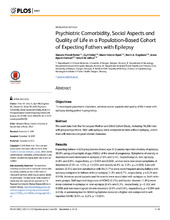Psychiatric Comorbidity, Social Aspects and Quality of Life in a Population-Based Cohort of Expecting Fathers with Epilepsy
Reiter, Simone B. C. Frizell; Veiby, Gyri; Bjørk, Marte Helene; Engelsen, Bernt; Daltveit, Anne Kjersti; Gilhus, Nils Erik
Peer reviewed, Journal article
Published version

Åpne
Permanent lenke
https://hdl.handle.net/1956/11655Utgivelsesdato
2015-12-04Metadata
Vis full innførselSamlinger
Originalversjon
https://doi.org/10.1371/journal.pone.0144159Sammendrag
Objectives. To investigate psychiatric disorders, adverse social aspects and quality of life in men with epilepsy during partner’s pregnancy. Method. We used data from the Norwegian Mother and Child Cohort Study, including 76,335 men with pregnant partners. Men with epilepsy were compared to men without epilepsy, and to men with non-neurological chronic diseases. Results. Expecting fathers in 658 pregnancies (mean age 31.8 years) reported a history of epilepsy, 36.9% using antiepileptic drugs (AEDs) at the onset of pregnancy. Symptoms of anxiety or depression were increased in epilepsy (7.0% and 3.9%, respectively) vs. non-epilepsy (4.6% and 2.5%, respectively, p = 0.004 and 0.023), and so were new onset symptoms of depression (2.0% vs. 1.0%, p < 0.031) and anxiety (4.3% vs. 2.3%, p = 0.023). Low self-esteem (2.5%) and low satisfaction with life (1.7%) were more frequent among fathers with epilepsy compared to fathers without epilepsy (1.3% and 0.7%, respectively, p = 0.01 and 0.010). Adverse social aspects and life events were associated with epilepsy vs. both reference groups. Self-reported diagnoses of ADHD (2.2%) and bipolar disorder (1.8%) were more common in epilepsy vs. non-epilepsy (0.4% and 0.3%, respectively, p = 0.002 and 0.003) and non-neurological chronic disorders (0.5% and 0.5%, respectively, p = 0.004 and 0.018). A screening tool for ADHD symptoms revealed a higher rate compared to self-reported ADHD (9.5% vs. 2.2%, p < 0.001). Conclusion. Expecting fathers with epilepsy are at high risk of depression and anxiety, adverse socioeconomic aspects, low self-esteem, and low satisfaction with life. Focus on mental health in fathers with epilepsy during and after pregnancy is important. The use of screening tools can be particularly useful to identify those at risk.
